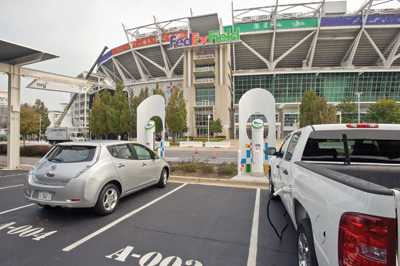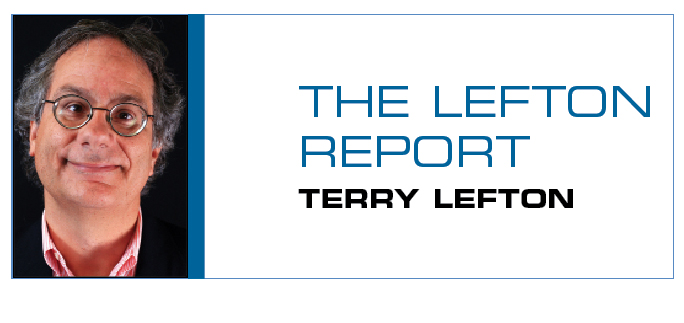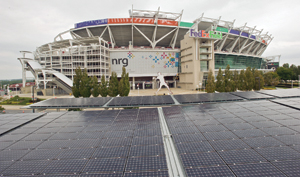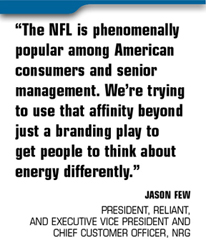Companies selling parity products depend on marketing to achieve marketplace distinction, however scant. Can there be a more difficult product or service to differentiate than electric power? Consumers notice it only when it isn’t working, and, while it may be indispensable, it isn’t exactly a sexy market. Shoelaces generate more consumer interest.
For the last two decades, sports marketing pros have been assaying the energy market to see whether it would grow into one of the larger sponsorship categories, but deregulation has been slower than expected. While there is an energy deal at most teams and venues, and a handful of naming-rights deals, we haven’t seen the category grow enough to rival beverages, cars or fast food.
Nonetheless, Reliant, one of the country’s largest providers and an early mover in the category when it comes to using sports assets, has lately built up the most potent collection of sports IP in the category. With the state of Texas deregulated before most markets, Reliant put its name on the Houston Texans’ home stadium in 2000 for a then-record $300 million.
More recently, with the emergence of
NRG as its parent brand and the slow unfolding of deregulation across the country, the company has fashioned an unwired network of NFL deals with some of the league’s most high-profile teams: the Dallas Cowboys, Washington Redskins, New York Giants and Jets and their new stadium, the New England Patriots, and a 20-year deal with the Philadelphia Eagles that we’re told will be
 |
NRG’s presence at FedEx Field includes solar panels and the “Solar Man” sculpture (top) and vehicle charging stations.
Photos by: NRG |
completed soon. If you are keeping score in football terms, that’s all of the NFC East, half of the AFC East, and both participants in Super Bowl XLVI.
With NRG as a new corporate moniker, the NFL team deals help with branding, even with Reliant and its other brands, like Green Mountain Energy, still in the market. What’s also fascinating about the deals is that they are or will be an amalgam of traditional sponsorship assets and physical build-outs, including solar-powered electric-vehicle charging stations, thousands of solar panels and, eventually, wind turbines.
“Everyone knows the NFL is phenomenally popular among American consumers and senior management,” said Jason Few, Reliant president and NRG’s executive vice president and chief customer officer. “We’re trying to use that affinity beyond just a branding play to get people to think about energy differently.”
It is a rare sponsorship that can attract both consumer and business-to-business customers, but that’s the goal here. Every brand is looking to burnish its green side, so NRG/Reliant is taking a page out of IBM’s sponsorship manual, using NFL venues as a demonstration platform for solar and wind efforts.
The infrastructure investments are another thing that makes these deals interesting. And the energy market is big enough that any new marketing effort bears observation.
“It’s an intriguing play, but the market is still young enough that we don’t know for sure if sports affinities move the needle yet,” said veteran marketer Larry Weil, who recently left his position with Branded Retail Energy, which pioneered energy frequency/loyalty programs with universities as large as Texas and Illinois. “It changes market by market, whether it’s a better play to target b-to-b or consumers and what activation is most effective. But I applaud anyone investing to figure it all out.”
“There are a lot of companies interested in having a more sustainable approach to how they conduct their businesses,” said Reliant Chief Marketing Officer Karen Jones. “But no one had really figured out how to physically represent what they were doing from a sustainability and environmental standpoint. We think that being able to paint that canvas at these NFL stadiums is a real opportunity.”
It was a big enough opportunity that it required two agencies.
IMG did strategic consulting and negotiations, while
Paragon Marketing has been handling activation and on-the-ground execution. Few said the Cowboys and Redskins deals have already yielded new business, and there’s also been some elevation in brand equity measures within those markets. Most of the build-outs will be apparent next season, however. Reliant/NRG got traditional sports marketing assets as well and activated with things like signs, hospitality, TV ads with
Troy Aikman and sales kiosks at stadiums.
Reliant’s, er, reliability also appealed to NFL club marketers, some of whom were wary of the fly-by-night nature of some alternative-energy companies.
“We didn’t have to worry about whether Reliant was solid. They are public, and they were investing across some of the league’s biggest teams,” said Giants Chief Marketing Officer Mike Stevens, adding that Reliant/NRG is in the permit-and-design phase of building a ring of solar panels around the top of MetLife Stadium.
“Our mission is to change a low-interest category to high interest, not just by tapping into that NFL affinity, but by really becoming part of the game, part of the buildings the game is played in,” said Few. That’s a lofty goal and a work in progress, but one we’ll be watching with interest that could best be described as high-voltage.
MARKETING TO MOMS: Add Olympic swimmer Michael Phelps’ mother, Debbie, to Subway’s roster of Famous Fans. Subway’s director of sports marketing, Paul Bamundo, said that beyond being the mother of one of the world’s most famous athletes, Phelps’ background in food science and education were appealing.
Full plans for Debbie Phelps’ use have not been completed, but she will appear in Fashion Week’s Heart Truth Fashion show on behalf of Subway. She previously did marketing work for Visa and Concerta, a drug used to treat ADHD.







